- Home
- John Irving
In One Person Page 3
In One Person Read online
Page 3
I don't even remember the reason Uncle Bob's name came up, and Tom already knew I was related to "old Let-'em-in Bob," as Tom called him.
"We're not related by blood," I'd started to explain. (Notwithstanding Uncle Bob's blood-alcohol level at any given time, there wasn't a drop of Winthrop blood in him.)
"You're not at all alike!" Tom had exclaimed. "Bob is just so nice, and so uncomplicated."
Granted, Tom and I had been arguing a lot that summer. We'd taken one of the Queen ships (student class) from New York to Southampton; we'd crossed to the continent, landing in Ostend, and the first town in Europe we'd stayed overnight in was the medieval city of Bruges. (Bruges was beautiful, but I was more infatuated with a girl who worked at the pension where we stayed than I was with the belfry atop the old Market Hall.)
"I suppose you were intending to ask her if she had a friend for me," Tom said.
"We just walked all over town--we just talked and talked," I told him. "We barely kissed."
"Oh, is that all?" Tom said--so when he later remarked that Uncle Bob was "just so nice, and so uncomplicated," I took it that Tom meant I wasn't nice.
"I just meant that you're complicated, Bill," Tom told me. "You're not as easygoing as Admissions Man Bob, are you?"
"I can't believe you're pissed off about that girl in Bruges," I told him.
"You should have seen how you stared at her tits--they didn't amount to much. You know, Bill--girls know when you're staring at their tits," Tom told me.
But the girl in Bruges was of no importance to me. It was only that her small breasts had reminded me of the rise and fall of Miss Frost's surprisingly girlish breasts, and I'd not gotten over Miss Frost.
OH, THE WINDS OF change; they do not blow gently into the small towns of northern New England. The first casting call that brought Richard Abbott to our town's little theater would even change how the women's roles were cast, for it was evident from the start that those parts calling for dashing young men and evil (or plainly bourgeois) husbands and treacherous lovers were all within Richard Abbott's grasp; hence the women chosen to play opposite Richard would have to match up to him.
This posed a problem for Grandpa Harry, who would soon be Richard's father-in-law--Grandpa Harry was too much the older woman to be romantically involved with a handsome young man like Richard in the first place. (There would be no onstage kissing for Richard Abbott and Grandpa Harry!)
And, befitting her superior-sounding voice but empty-minded character, this posed a greater problem for my aunt Muriel. Richard Abbott was too much leading-man material for her. His appearance at that very first casting call reduced Muriel to psychosexual babble and dithering; my devastated aunt said later that she could tell my mom and Richard were "moonstruck by each other from the start." It was altogether too much for Muriel to imagine being romantically involved with her future brother-in-law--even onstage. (And with my mother prompting them, no less!)
At thirteen, I detected little of my aunt Muriel's consternation at encountering (for the first time) what leading-man material was like; nor did I recognize that my mom and Richard Abbott were "moonstruck by each other from the start."
Grandpa Harry was charming and entirely welcoming to the graceful young man, who was brand-new to the faculty at Favorite River Academy. "We're always lookin' for new actin' talent," Grandpa said warmly to Richard. "Did you say it was Shakespeare you're teachin'?"
"Teaching and putting onstage," Richard answered my grandfather. "There are theatrical disadvantages at an all-boys' school, of course--but the best way for young boys or girls to understand Shakespeare is for them to put on the plays."
"You mean by 'disadvantages,' I would guess, that the boys have to play the women's roles," Grandpa Harry said slyly. (Richard Abbott, upon first meeting the mill manager Harry Marshall, could not have known about the lumberman's success as an onstage cross-dresser.)
"Most boys haven't the vaguest idea how to be a woman--it's a mortal distraction from the play," Richard said.
"Ah," Grandpa Harry said. "Then how will you manage it?"
"I'm thinking of asking the younger faculty wives to audition for roles," Richard Abbott replied, "and the older faculty daughters, maybe."
"Ah," Grandpa Harry said again. "There might be townspeople who are also qualified," my grandfather suggested; he'd always wanted to play Regan or Goneril, "Lear's loathsome daughters," as Grandpa alliteratively spoke of them. (Not to mention how he longed to play Lady Macbeth!)
"I'm considering open auditions," Richard Abbott said. "But I hope the older women won't be intimidating to the boys at an all-boys' school."
"Ah, well--there's always that," Grandpa Harry said with a knowing smile. As an older woman, he'd been intimidating countless times; Harry Marshall had merely to look at his wife and elder daughter to know how female intimidation worked. But, at thirteen, I was unaware of my grandfather's jockeying for more women's roles; the conversation between Grandpa Harry and the new leading man seemed entirely friendly and natural to me.
What I noticed on that fall Friday night--casting calls were always on Friday nights--was how the dynamic between our theater's dictatorial director and our variously talented (and untalented) would-be cast was changed by Richard Abbott's knowledge of the theater, as much as by Richard's gifts as an actor. The stern director of the First Sister Players had never been challenged as a dramaturge before; our little theater's director, who said he had no interest in "merely acting," was no amateur in the area of dramaturgy, and he was a self-appointed expert on Ibsen, whom he worshipped to excess.
Our heretofore-unchallenged director, Nils Borkman--the aforementioned Norwegian who was also Grandpa Harry's business partner and, as such, a forester and logger and dramaturge--was the very picture of Scandinavian depression and melancholic forebodings. Logging was Nils Borkman's business--or, at least, his day job--but dramaturgy was his passion.
It further contributed to the Norwegian's ever-blackening pessimism that the unsophisticated theatergoers in First Sister, Vermont, were unschooled in serious drama. A steady diet of Agatha Christie was expected (even nauseatingly welcome) in our culturally deprived town. Nils Borkman visibly suffered through the ceaseless adaptations of lowbrow potboilers like Murder at the Vicarage, a Miss Marple mystery; my superior-sounding aunt Muriel had many times played Miss Marple, but the denizens of First Sister preferred Grandpa Harry in that shrewd (but oh-so-feminine) role. Harry seemed more believable at divining other people's secrets--not to mention, at Miss Marple's age, more feminine.
At one rehearsal, Harry had whimsically said--as Miss Marple herself might have--"My word, but who would want Colonel Protheroe dead?"
To which my mom, ever the prompter, had remarked, "Daddy, that line isn't even in the script."
"I know, Mary--I was just foolin' around," Grandpa said.
My mother, Mary Marshall--Mary Dean (for those unlucky fourteen years before she married Richard Abbott)--always called my grandpa Daddy. Harry was unfailingly addressed as Father by my lofty-sounding aunt Muriel, in the same black-tie-dinner tone of voice that Nana Victoria unstintingly hailed her husband as Harold--never Harry.
Nils Borkman directed Agatha Christie's "crowd-pleasers," as he mockingly referred to them, as if he were doomed to be watching Death on the Nile or Peril at End House on the night of his death--as if his indelible memory of Ten Little Indians might be the one he would take to his grave.
Agatha Christie was Borkman's curse, which the Norwegian bore less than stoically--he hated her, and he complained about her bitterly--but because he filled the house with Agatha Christie, and similarly shallow entertainments of the time, the morbid Norwegian was permitted to direct "something serious" as the fall play every year.
"Something serious to coincide with that time of year when the leafs are dying," Borkman said--the leafs word indicating that his command of English was usually clear but imperfect. (That was Nils in a nutshell--usually clear but imperfect.)
On that Friday casting call, when Richard Abbott would change many futures, Nils announced that this fall's "something serious" would again be his beloved Ibsen, and Nils had narrowed the choice of which Ibsen to a mere three.
"Which three?" the young and talented Richard Abbott asked.
"The problem three," Nils answered--he presumed, definitively.
"I take it you mean Hedda Gabler and A Doll's House," Richard rightly guessed. "And would the third be The Wild Duck?"
By Borkman's uncharacteristic speechlessness, we all saw that, indeed, The (dreaded) Wild Duck was the dour Norwegian's third choice.
"In that case," Richard Abbott ventured, after the telltale silence, "who among us can possibly play the doomed Hedvig--that poor child?" There were no fourteen-year-old girls at the Friday night casting call--no one at all suitable for the innocent, duck-loving (and daddy-loving) Hedvig.
"We've had . . . difficulties with the Hedvig part before, Nils," Grandpa Harry ventured. Oh, my--had we ever! There'd been tragicomic fourteen-year-old girls who were such abysmal actors that when the time came for them to shoot themselves, the audience had cheered! There'd been fourteen-year-old girls who were so winningly naive and innocent that when they shot themselves, the audience was outraged!
"And then there's Gregers," Richard Abbott interjected. "That miserable moralizer. I could play Gregers, but only as a meddlesome fool--a self-righteous and self-pitying clown!"
Nils Borkman often referred to his fellow Norwegians who were suicidal as "fjord-jumpers." Apparently, the abundance of fjords in Norway provided many opportunities for convenient and unmessy suicides. (Nils must have noticed, to his further gloom, that there were no fjords in Vermont--a landlocked state.) Nils now looked at Richard Abbott in such a scary way--it was as if our depressed director wanted this upstart newcomer to find the nearest fjord.
"But Gregers is an idealist," Borkman began.
"If The Wild Duck is a tragedy, then Gregers is a fool and a clown--and Hjalmar is nothing more than a jealous husband of the pathetic, before-she-met-me kind," Richard continued. "If, on the other hand, you play The Wild Duck as a comedy, then they're all fools and clowns. But how can the play be a comedy when a child dies because of adult moralizing? You need a heartbreaking Hedvig, who must be an utterly innocent and naive fourteen-year-old; and not only Gregers but Hjalmar and Gina, and even Mrs. Sorby and Old Ekdal and the villainous Werle, must be brilliant actors! Even then, the play is flawed--not the easiest amateur production of Ibsen that comes to mind."
"Flawed!" Nils Borkman cried, as if he (and his wild duck) had been shot.
"I was Mrs. Sorby in the most recent manifestation," my grandfather told Richard. "Of course, when I was younger, I got to play Gina--albeit only once or twice."
"I had thoughts of young Laura Gordon as Hedvig," Nils said. Laura was the youngest Gordon girl. Jim Gordon was on the faculty at Favorite River Academy; he and his wife, Ellen, had been actors for the First Sister Players in the past, and two older Gordon daughters had previously shot themselves as poor Hedvig.
"Excuse me, Nils," my aunt Muriel interposed, "but Laura Gordon has highly visible breasts."
I saw I was not alone in noticing the fourteen-year-old's astonishing development; Laura was barely a year older than I was, but her breasts were way beyond what an innocent and naive Hedvig should have.
Nils Borkman sighed; he said (with near-suicidal resignation) to Richard, "And what would the young Mr. Abbott consider an easier Ibsen for us mortally mere amateurs to perform?" Nils meant "merely mortal," of course.
"Ah . . ." Grandpa Harry began; then he stopped himself. My grandfather was enjoying this. He had the utmost respect and affection for Nils Borkman as a business partner, but--without exception--every keenly devoted and most casual member of the First Sister Players knew Nils to be an absolute tyrant as a director. (And we were almost as sick of Henrik Ibsen, and Borkman's idea of serious drama, as we were of Agatha Christie!)
"Well . . ." Richard Abbott began; there was a thoughtful pause. "If it's going to be Ibsen--and we are, after all, only amateurs--it should be either Hedda Gabler or A Doll's House. No children at all in the former, and the children are of no importance as actors in the latter. Of course, there is the need for a very strong and complicated woman--in either play--and for the usual weak or unlikable men, or both."
"Weak or unlikable, or both?" Nils Borkman asked, in disbelief.
"Hedda's husband, George, is ineffectual and conventional--an awful combination of weaknesses, but an utterly common condition in men," Richard Abbott continued. "Eilert Lovborg is an insecure weakling, whereas Judge Brack--like his name--is despicable. Doesn't Hedda shoot herself because of her foreseeable future with both her ineffectual husband and the despicable Brack?"
"Are Norwegians always shooting themselves, Nils?" my grandfather asked in a mischievous way. Harry knew how to push Borkman's buttons; this time, however, Nils resisted a fjord-jumping story--he ignored his old friend and cross-dressing business partner. (Grandpa Harry had played Hedda many times; he'd been Nora in A Doll's House, too--but, at his age, he was no longer suitable for either of these female leads.)
"And what . . . weaknesses and other unlikable traits do the male characters in A Doll's House present us with--if I may ask the young Mr. Abbott?" Borkman sputtered, wringing his hands.
"Husbands are not Ibsen's favorite people," Richard Abbott began; there was no pausing to think now--he had all the confidence of youth and a brand-new education. "Torvald Helmer, Nora's husband--well, he's not unlike Hedda's husband. He's both boring and conventional--the marriage is stifling. Krogstad is a wounded man, and a corrupted one; he's not without some redeeming decency, but the weakness word also comes to mind in Krogstad's case."
"And Dr. Rank?" Borkman asked.
"Dr. Rank is of no real importance. We need a Nora or a Hedda," Richard Abbott said. "In Hedda's case, a woman who prizes her freedom enough to kill herself in order not to lose it; her suicide is not a weakness but a demonstration of her sexual strength."
Unfortunately--or fortunately, depending on your point of view--Richard took this moment to glance at Aunt Muriel. Her good looks and opera singer's swaggering bosom notwithstanding, Muriel was not a tower of sexual strength; she fainted.
"Muriel--no histrionics, please!" Grandpa Harry cried, but Muriel (consciously or unconsciously) had foreseen that she did not match up well with the confident young newcomer, the sudden shining star of leading-man material. Muriel had physically taken herself out of the running for Hedda.
"And in the case of Nora . . ." Nils said to Richard Abbott, barely pausing to survey my mother's ministrations to her older, domineering (but now fainted) sister.
Muriel suddenly sat up with a dazed expression, her bosom dramatically heaving.
"Breathe in through your nose, Muriel, and out through your mouth," my mother prompted her sister.
"I know, Mary--I know!" Muriel said with exasperation.
"But you're doing it the other way--you know, in through your mouth and out through your nose," my mother said.
"Well . . ." Richard Abbott started to say; then he stopped. Even I saw how he looked at my mom.
Richard, who'd lost the toes of his left foot to a lawn-mower accident, which disqualified him from military service, had come to teach at Favorite River Academy directly upon receiving a master's degree in the history of theater and drama. Richard had been born and grew up in western Massachusetts. He had fond memories of family ski vacations in Vermont, when he'd been a child; a job (for which he was overqualified) in First Sister, Vermont, had attracted him for sentimental reasons.
Richard Abbott was only four years older than my code-boy father had been in that photograph--when the sergeant was en route to Trinidad in '45. Richard was twenty-five--my mom was thirty-five. Richard was a whopping ten years younger than my mother. Mom must have liked younger men; she'd certainly liked me better when I was younger.
"A
nd do you act, Miss--" Richard began again, but my mom knew he was speaking to her, and she cut him off.
"No, I'm just the prompter," she told him. "I don't act."
"Ah, but, Mary--" Grandpa Harry began.
"I don't, Daddy," my mother said. "You and Muriel are the actresses," she said, with no uncertain emphasis on the actresses word. "I'm always the prompter."
"About Nora?" Nils Borkman asked Richard. "You were something saying--"
"Nora is more about freedom than Hedda," Richard Abbott confidently said. "She not only has the strength to leave her husband; she leaves her children, too! There is such an untamable freedom in these women--I say, let your actor who will be Hedda or Nora choose. These women own these plays."
As he spoke, Richard Abbott was surveying our amateur theatrical society for possible Heddas or Noras, but his eyes kept coming back to my mother, who I knew was obdurately (forever) the prompter. Richard would not make a Hedda or a Nora out of my follow-the-script mom.
"Ah, well . . ." Grandpa Harry said; he was reconsidering the part, either Nora or Hedda (his age notwithstanding).
"No, Harry--not you again," Nils said, his old dictatorial self emerging. "Young Mr. Abbott is right. There must be a certain lawlessness--both an uncontainable freedom and a sexual strength. We need a younger, more sexual activity woman than you."
Richard Abbott was regarding my grandfather with growing respect; Richard saw how Grandpa Harry had established himself as a woman to be reckoned with among the First Sister Players--if not as a sexual activity woman.
"Won't you consider it, Muriel?" Borkman asked my superior-sounding aunt.
"Yes, will you?" Richard Abbott, who was more than a decade younger than Muriel, asked. "You have an unquestionable sexual presence--" he started to say.
Alas, that was as far as young Mr. Abbott got--the presence word, modified by sexual--before Muriel fainted again.
"I think that's a 'no,' if I had to guess," my mom told the dazzling young newcomer.
I already had a bit of a crush on Richard Abbott, but I hadn't yet met Miss Frost.

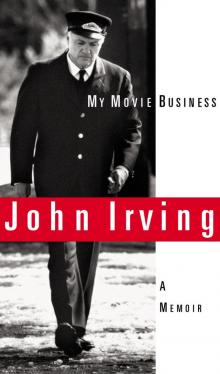 My Movie Business: A Memoir
My Movie Business: A Memoir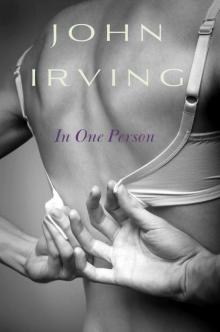 In One Person
In One Person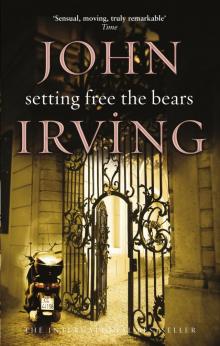 Setting Free the Bears
Setting Free the Bears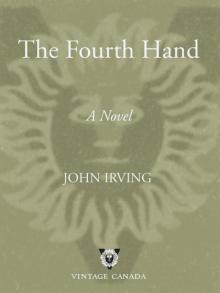 The Fourth Hand
The Fourth Hand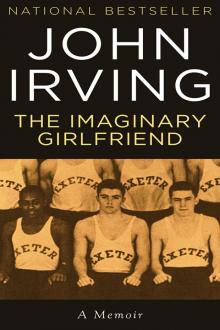 The Imaginary Girlfriend
The Imaginary Girlfriend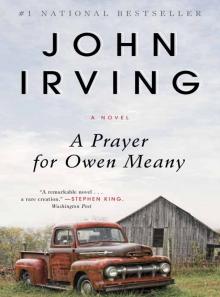 A Prayer for Owen Meany
A Prayer for Owen Meany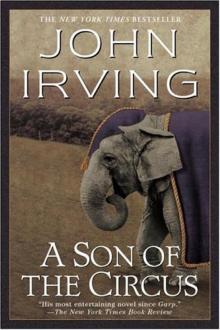 A Son of the Circus
A Son of the Circus Last Night in Twisted River
Last Night in Twisted River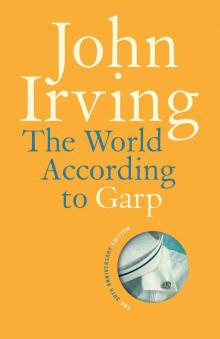 The World According to Garp
The World According to Garp The Cider House Rules
The Cider House Rules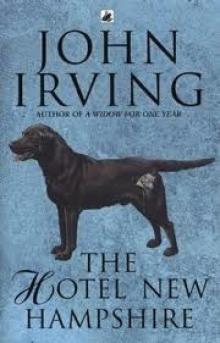 The Hotel New Hampshire
The Hotel New Hampshire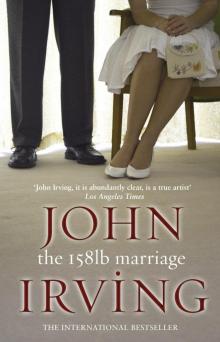 The 158-Pound Marriage
The 158-Pound Marriage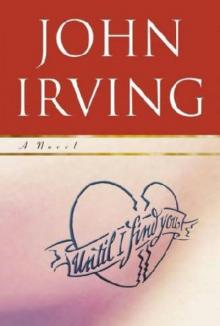 Until I Find You
Until I Find You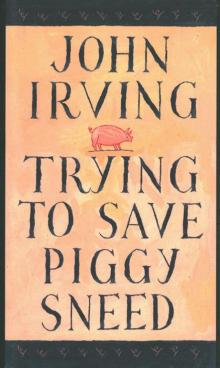 Trying to Save Piggy Sneed
Trying to Save Piggy Sneed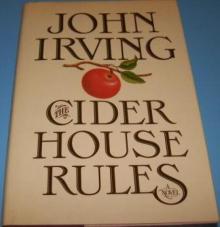 Cider House Rules
Cider House Rules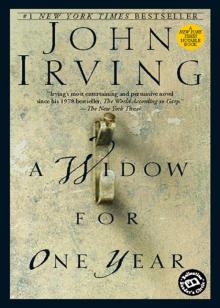 A Widow for One Year
A Widow for One Year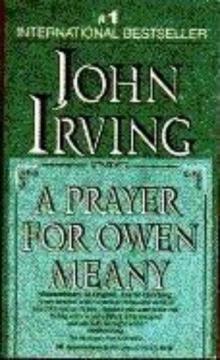 A prayer for Owen Meany: a novel
A prayer for Owen Meany: a novel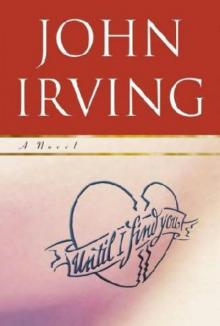 (2005) Until I Find You
(2005) Until I Find You